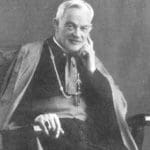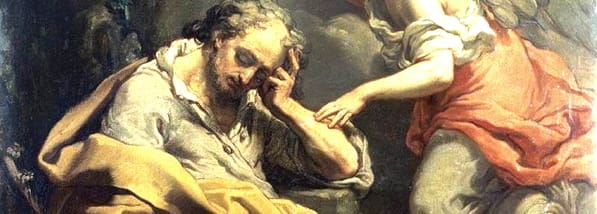PERSECUTION
“And when they were departed, behold, an Angel of the Lord appeared in sleep to Joseph, saying, ‘Arise and take the Child and His Mother, and fly into Egypt, and be there until I shall tell thee. For it will come to pass that Herod will seek the Child to destroy Him.
Matthew 2:13
1. Our Lady has already learnt that the hand of God invariably bestows its favours in two parts; if there is intense joy as one ingredient, the other is also intense suffering. The Nativity was a scene of joy, but it was also a scene of utter poverty and seemingly needless privation. The conferring of the Holy Name of Jesus was a glad ceremony, but it was accompanied with the first blood-shedding of her little Child. The joy of the Presentation, and of her own Purification, had been followed immediately by the promise of the sword of sorrow. Hence, when she looked upon the Magi pouring out their treasures and their hearts at the feet of her Son, saying, “I have found Him Whom my soul loveth, I have held Him and will not let Him go,” she might well have asked herself what new trial was in store for them, for her Child, for Joseph, and for herself.
 2. And we may well carry her reflection further, for there is scarcely any scene in the life of our Lord which is more prophetic than this scene of the flight into Egypt. “By the sweat of thy brow shalt thou eat bread.” So had God spoken to Adam, and through Adam to the whole human race. Out of love for man He decreed that suffering should be his lot; and in one sense the more He loved the more He would permit man to suffer. He should suffer by failure, he should suffer in himself, he should suffer most of all from his fellowmen, by persecution. God would not interfere when man rose unjustly against man. When malice more than human–for such has invariably been the mark of persecution–rose against His own. He would not put out His hand to prevent it. Those He loved, His Church, His saints, His individual followers in the secrets of the hearts, should have the fullest share of His favours; but if they were to have most joy in life, they were also to have most sorrow.
2. And we may well carry her reflection further, for there is scarcely any scene in the life of our Lord which is more prophetic than this scene of the flight into Egypt. “By the sweat of thy brow shalt thou eat bread.” So had God spoken to Adam, and through Adam to the whole human race. Out of love for man He decreed that suffering should be his lot; and in one sense the more He loved the more He would permit man to suffer. He should suffer by failure, he should suffer in himself, he should suffer most of all from his fellowmen, by persecution. God would not interfere when man rose unjustly against man. When malice more than human–for such has invariably been the mark of persecution–rose against His own. He would not put out His hand to prevent it. Those He loved, His Church, His saints, His individual followers in the secrets of the hearts, should have the fullest share of His favours; but if they were to have most joy in life, they were also to have most sorrow.
3. We need not hope to fathom the complete understanding of all this; that is reserved for the day when “all things have been made new,” when the lights and shades in the picture are seen in their perfect setting, when “God shall wipe away all tears from their eyes, and death shall be no more, nor mourning, nor crying, nor sorrow shall be any more, for the former things are passed away.” It is enough for us to know that our Lord Himself has specially blessed the persecuted: “Blessed are they that suffer persecution for justice sake, for theirs is the Kingdom of Heaven.” It is enough to know that those who understood Him best “rejoiced that they were accounted worthy to suffer something for the name of Christ.” It is enough to see with our own eyes the discipline of persecution, its chastening effect, its power of drawing the best out of humankind, the heroism, the truth of life, the strength of purpose to which it witnesses, and, finally, the honour and glory it wins from God and man alike.
Summary Meditation Points:
- Suffering as well as joy is the gift of God to those whom He loves best.
- The same is seen not only in the life of Our Lord but in the life of the whole Church.
- The reasons are manifold, though we cannot hope to understand them all.
 Editor’s Note: This meditation is from Archbishop Alban Goodier’s “The Prince of Peace” (1913).
Editor’s Note: This meditation is from Archbishop Alban Goodier’s “The Prince of Peace” (1913).




